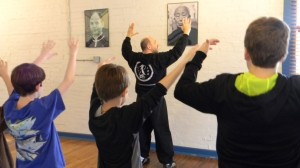Mindfulness from Tai Chi
A recent article, published in Frontiers in Human Neuroscience, describes an experiment in which healthy young adults with inattentive type of attention deficit disorder showed improvements in specific tasks, after taking a Tai Chi class for 15 weeks. The results show improvement on the participants’ ability to focus, which leads the researchers to conclude that Tai Chi can help people with inattention improve in certain activities of daily living. That is, people are more “mindful” of what they are doing – a new definition of “staying on task.”
 This article intrigued me because it seems like Tai Chi could appeal to many people with attention issues. Many of my clients enjoy sports – or some form of movement like dance. I was also taken with the first sentence of the article: “The use of mind-body techniques to enhance cognitive function in young adults and adolescents would provide an attractive alternative to pharmacological treatment of conditions such as attention deficit hyperactivity disorder (ADHD), as well as non-medical use of stimulants for performance enhancement.” In my opinion, it is a bit strange to see a statement like that in a scientific article, but it is a strong motivation for many people – particularly parents of children with this disorder – to find non-pharmaceutical solutions to attention deficits.
This article intrigued me because it seems like Tai Chi could appeal to many people with attention issues. Many of my clients enjoy sports – or some form of movement like dance. I was also taken with the first sentence of the article: “The use of mind-body techniques to enhance cognitive function in young adults and adolescents would provide an attractive alternative to pharmacological treatment of conditions such as attention deficit hyperactivity disorder (ADHD), as well as non-medical use of stimulants for performance enhancement.” In my opinion, it is a bit strange to see a statement like that in a scientific article, but it is a strong motivation for many people – particularly parents of children with this disorder – to find non-pharmaceutical solutions to attention deficits.
Furthermore, any form of regular exercise is helpful for all of us. We probably can intuit that something like yoga or Tai Chi would be helpful for people who need to learn to concentrate better, since you engage your focus over and over again on something abstract, such as a sequence of poses or watching your breathing.
But, is it really like strengthening a “muscle” that will suddenly spring into action throughout your normal day? If you have inattentive type of ADHD, will forcing yourself to focus on an abstract task twice a week for 2 hours somehow retrain your mind to be able to do it “on demand”? Or does it work that way? This article doesn’t address that.
Other experts claim this is what happens. Recently, Time magazine had an article on mindfulness (February 3, 2014, p. 40), where experts such as Jon Kabat-Zinn are credited with this muscle-strengthening concept. The article’s author, Kate Pickert, writes, “… think of your attention as a muscle. As with any muscle, it makes sense to exercise it (in this case, with meditation), and like any muscle, it will strengthen from that exercise” (p. 43). While this isn’t backed up with evidence, other ways meditation makes physical changes to the body are: experiments have been done that show that cortisol levels and blood pressure levels can be lowered after engaging in consistent meditation exercises.
One of the authors on the research paper on Tai Chi, Richard J. Davidson, is well known for his work on studying the brains of people who meditate. He pioneered the field of using MRI scans of healthy people to see what sections of the brain were active during various activities. He is himself a practitioner of meditation, and believes it helps him conduct his life productively – he is prolific in his writing, very active physically, and he directs a very busy lab at the University of Wisconsin AND a foundation called the Center for Investigating Health Minds. https://www.investigatinghealthyminds.org/ and https://brainimaging.waisman.wisc.edu/ .
 As I read this article, I found myself either nodding my head, or shaking it… At least we can say that Tai Chi is a form of exercise, like yoga, and it will definitely help you or your child reduce stress during the session and probably the rest of the day that you’ve taken the Tai Chi class. Since having ADHD creates a lot of stress in a family, anything you do to reduce that is good, and helpful, and hopeful.
As I read this article, I found myself either nodding my head, or shaking it… At least we can say that Tai Chi is a form of exercise, like yoga, and it will definitely help you or your child reduce stress during the session and probably the rest of the day that you’ve taken the Tai Chi class. Since having ADHD creates a lot of stress in a family, anything you do to reduce that is good, and helpful, and hopeful.
